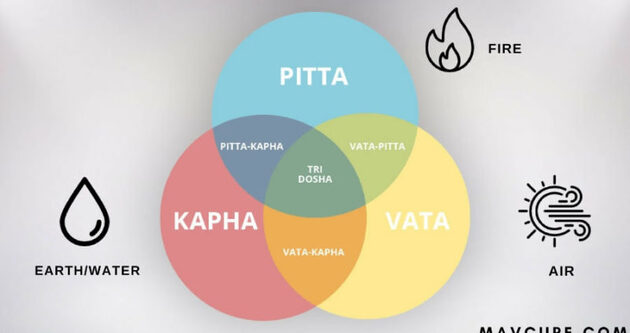|
Ayurvedic medicine, is a healthy-lifestyle system that people in India have used for more than 5,000 years. Ayurveda emphasizes good health and prevention and treatment of illness through lifestyle practices (such as massage, meditation, yoga, and dietary changes) and the use of herbal remedies.
Ayurveda, a natural system of medicine, originated in India more than 3,000 years ago. The term Ayurveda is derived from the Sanskrit words ayur (life) and veda (science or knowledge). Thus, Ayurveda translates to knowledge of life. |
|
Ayurveda, a natural system of medicine, originated in India more than 3,000 years ago. The term Ayurveda is derived from the Sanskrit words ayur (life) and veda (science or knowledge). Thus, Ayurveda translates to knowledge of life. Based on the idea that disease is due to an imbalance or stress in a person's consciousness, Ayurveda encourages certain lifestyle interventions and natural therapies to regain a balance between the body, mind, spirit, and the environment.
|
Ayurveda treatment starts with an internal purification process, followed by a special diet, herbal remedies, massage therapy, yoga, and meditation.
The concepts of universal interconnectedness, the body's constitution (prakriti), and life forces (doshas) are the primary basis of ayurvedic medicine. Goals of treatment aid the person by eliminating impurities, reducing symptoms, increasing resistance to disease, reducing worry, and increasing harmony in life. Herbs and other plants, including oils and common spices, are used extensively in Ayurvedic treatment. |
There is no good evidence that Ayurveda is effective for treating any disease. Ayurvedic preparations have been found to contain lead, mercury, and arsenic, substances known to be harmful to humans.
Ayurveda and Your Life Energy
Students of CAM therapy believe that everything in the universe – dead or alive – is connected. If your mind, body, and spirit are in harmony with the universe, you have good health. When something disrupts this balance, you get sick. Among the things that can upset this balance are genetic or birth defects, injuries, climate and seasonal change, age, and your emotions.
Those who practice Ayurveda believe every person is made of five basic elements found in the universe: space, air, fire, water, and earth.
These combine in the human body to form three life forces or energies, called doshas. They control how your body works. They are Vata dosha (space and air); Pitta dosha (fire and water); and Kapha dosha (water and earth).
Everyone inherits a unique mix of the three doshas. But one is usually stronger than the others. Each one controls a different body function. It’s believed that your chances of getting sick -- and the health issues you develop -- are linked to the balance of your doshas.
Ayurveda and Your Life Energy
Students of CAM therapy believe that everything in the universe – dead or alive – is connected. If your mind, body, and spirit are in harmony with the universe, you have good health. When something disrupts this balance, you get sick. Among the things that can upset this balance are genetic or birth defects, injuries, climate and seasonal change, age, and your emotions.
Those who practice Ayurveda believe every person is made of five basic elements found in the universe: space, air, fire, water, and earth.
These combine in the human body to form three life forces or energies, called doshas. They control how your body works. They are Vata dosha (space and air); Pitta dosha (fire and water); and Kapha dosha (water and earth).
Everyone inherits a unique mix of the three doshas. But one is usually stronger than the others. Each one controls a different body function. It’s believed that your chances of getting sick -- and the health issues you develop -- are linked to the balance of your doshas.
Characteristics of each Dosha
|
Vata Dosha Those who practice Ayurveda believe this is the most powerful of all three doshas. It controls very basic body functions, like how cells divide. It also controls your mind, breathing, blood flow, heart function, and ability to get rid of waste through your intestines. Things that can disrupt it include eating again too soon after a meal, fear, grief, and staying up too late.
If vata dosha is your main life force, you’re thought to be more likely to develop conditions like anxiety, asthma, heart disease, skin problems, and rheumatoid arthritis. |
Pitta Dosha This energy controls your digestion, metabolism (how well you break down foods), and certain hormones that are linked to your appetite.
Things that can disrupt it are eating sour or spicy foods and spending too much time in the sun. If it’s your main life force, you’re thought to be more likely to develop conditions like Crohn’s disease, heart disease, high blood pressure, and infections. |
Kapha Dosha This life force controls muscle growth, body strength and stability, weight, and your immune system.
You can disrupt it by sleeping during the day, eating too many sweet foods, and eating or drinking things that contain too much salt or water. If it’s your main life energy, practitioners believe you may develop asthma and other breathing disorders, cancer, diabetes, nausea after eating, and obesity. |
Philosophy of Ayurvedic Medicine
In Ayurveda, perfect health is defined as "a balance between body, mind, spirit, and social wellbeing." In fact, the twin concepts of balance and connectedness echo throughout Ayurvedic texts, thought, and practice.
Like all holistic health systems, Ayurveda emphasizes the unshakable connections between the body, mind, and spirit. However, Ayurveda's connectedness extends far beyond the individual, reaching into the universal.
Like all holistic health systems, Ayurveda emphasizes the unshakable connections between the body, mind, and spirit. However, Ayurveda's connectedness extends far beyond the individual, reaching into the universal.

Basic tenets include:
- All things in the universe, both living and nonliving, are joined together. In fact, everything in the universe is actually made of the same five gross natural elements: space, air, fire, water, and earth.
- There is a deep connection between the self and the environment.
- We are all initially connected within ourselves, to people surrounding us, to our immediate environment, and to the universe. This balanced connectivity ensures good health.
- We remain healthy if we retain balance, interacting with our environment in an effective and wholesome way.
- However, our initial balance is often disrupted by our lifestyles. Choices about diet, exercise, profession, and relationships all have the potential to create physical, emotional, or spiritual imbalances.
- This imbalance causes a lack of harmony, and makes us more susceptible to disease.





